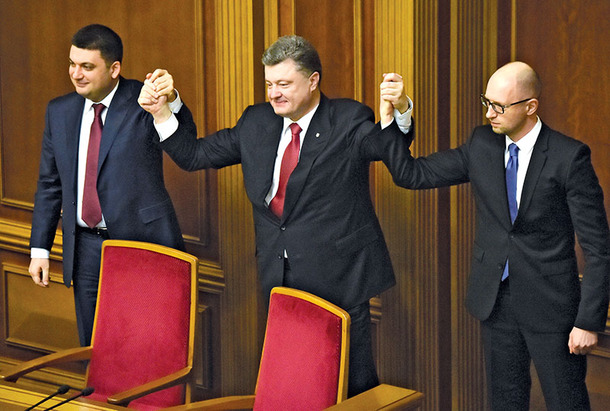By Andriy Meleshevych (National University of Kyiv-Mohyla Academy)
The snap elections for Ukraine’s parliament, the Rada, which took place on 26 October 2014, brought a major realignment to the country’s political parties. Political forces affiliated with communist ideology and the former authoritarian regime of Viktor Yanukovych, which supported Russia and bred corruption, either disappeared from the national political map or significantly reduced its presence in the national legislature. The Communist Party of Ukraine, which always held a sizable party faction in all convocations of the Rada since 1991, when Ukraine gained its independence, did not manage to clear the five percent electoral threshold required to enter the parliament. The Opposition Bloc, “a repackaged version of the Party of the Regions,” The five other political parties that entered the Rada as a result of the 2014 parliamentary elections were active supporters of the Euromaidan and further integration of Ukraine into European institutions. They are: Soon after the elections, these five political organizations launched talks which resulted in a coalitional agreement[2] signed by all five parties on November 21, 2014. Simultaneously, coalition members negotiated the composition of the new Cabinet of Ministers. On November 27, 2014, People’s Front leader Arseniy Yatsenyuk was reappointed as the head of government, a post he has occupied since February 27, 2014. Another nineteen members of the Ukrainian Cabinet were appointed on December 2, 2014. Anne Applebaum called this Cabinet “the best government Ukraine has ever had.”[3] The composition of the current Cabinet of Ministers is drastically different from all other governments in post-Soviet Ukraine. Perhaps its most distinguishing characteristic is the fact that most ministers were educated in well-known universities in Western Europe and North America and speak fluent English and other languages beyond Ukrainian. Three members of the Cabinet were granted Ukrainian citizenship on the day of their appointments to their posts in order to qualify them for the top governmental positions. Natalie Yaresko, who had the US citizenship previously, took the office of the Minister of Finance; Aivaras Abromavicius, a former citizen of Lithuania, became the Minister of Economy and Trade; Georgian citizen Alexander Kvitashvili was appointed the Minister of Health. The new Cabinet, the second serving under Yatsenyuk, fits neither the classical model of “a party government” nor a non-ideological technocratic government whose members are recruited from outside parliaments and “are often viewed as technocrats with little feeling or attention for the party political dimensions of policy making.”[4] In fact, to a certain extent the new government combines both of these principles. All five member-parties of the coalition, as well as President Poroshenko, could nominate cabinet members and, in fact, four parties are represented in the government.[5] Some of these nominees were members of political parties, for example, Valeriy Vorshchevsky (Radical Party, Vice Prime Minister), Vyacheslav Kyrylenko (People’s Front, Vice Prime Minister), and Ihor Zhdanov (Fatherland, Minister of Youth and Sports). Although a number of non-affiliated cabinet members did participate in the parliamentary elections through one of the five parties’ lists and became MPs, they have quite loose relations to these political organizations, for example, Serhiy Kvit (Petro Poroshenko Bloc, Education and Science) and Arsen Avakov (People’s Front, Internal Affairs). The majority of cabinet members may be considered “non-party technocrats,” for example, Stepan Poltorak (Defense), Volodymyr Demchyshyn (Fuel and Energy), Andriy Pyvovarsky (Infrastructure), Oleksiy Pavlenko (Agrarian Policy and Food), Ihor Shevchenko (Ecology and Natural Resources) in addition to newly-minted Ukrainian citizens Natalie Yaresko, Aivaras Abromavicius, and Alexander Kvitashvili. However, all these functionaries can hardly be called non-ideological – on numerous occasions they demonstrated their pro-European leaning and values. This is of instrumental significance in the Ukrainian context since the whole political scene in the nation since 2013 has been dominated by a pro-European/democratic values versus pro-Russian/authoritarian values cleavage. Today, after a year of instability and chaos in the Rada, both the parliamentary coalition and the government seem quite stable and operational. Although Ukrainian political life is full of surprises and unpredictability, for the time being the governing coalition enjoys unity and cooperation on the most important issues. This status quo is likely to persist for a while for three reasons. First, the grave situation in the Donetsk and Luhansk regions and a de facto war with the Russian Federation require partnership and concord of all pro-Ukrainian forces in the country. Second, without consolidation and collaboration of all pro-European political actors in Ukraine, the country will not be able to overcome the severe economic crisis by encouraging foreign investment, fostering domestic business growth, and securing international assistance. Third, all parties that compise the governing coalition both in the Rada and the Cabinet firmly expressed their desire to break away from Russian dominance and integrate into European political, economic, and military institutions. This critical time in Ukraine’s history is cementing the joint, collaborative efforts of these political forces. [1] Bateson, Ian, “Opposition Bloc outperforms forecasts, expected to be fourth largest party”, KyivPost (Internet Edition), October 27, 2014, available at http://www.kyivpost.com/content/kyiv-post-plus/opposition-bloc-outperforms-forecasts-expected-to-be-fourth-largest-party-369650.html. [2] See: Verkhovna Rada, VIII Convocation, Coalition Agreement, available at http://samopomich.ua/wp-content/uploads/2014/11/Koaliciyna_uhoda_parafovana_20.11.pdf. [3] See: https://twitter.com/anneapplebaum/status/547284106946826241. [4] De Winter, Lieven, “Parliamentary and Party Pathways to the Cabinet,” in Blondel, Jean, and Jean-Louis Thiébault (eds.) The Profession of Government Minister in Western Europe, New York: St. Martin’s Press, 1991, 44. [5] Self Reliance abstained from nominating its members to the Yatsenyuk-2 cabinet and claimed the office of the Vice Speaker of the Parliament. Oksana Syroid has been elected to this position.


